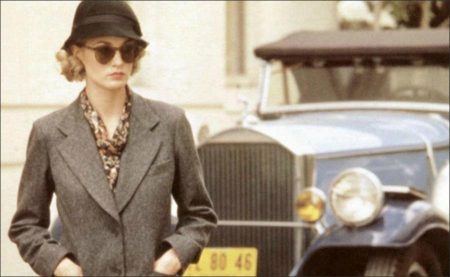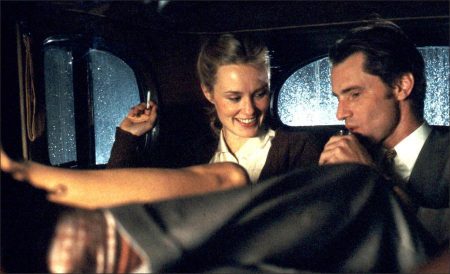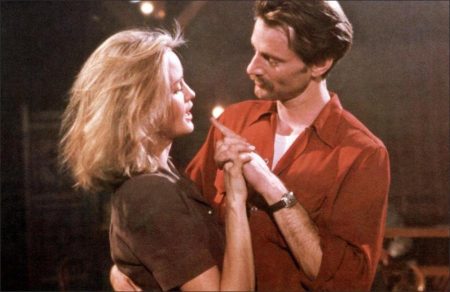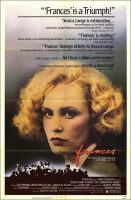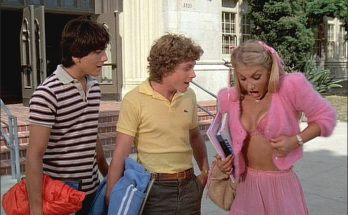Frances Farmer, a precocious Seattle teenager, takes unpopular social and political positions, to the mixed reactions of her parents. Frances becomes an actress and has some strong success in New York, but her refusal to bend her convictions and her outspoken (but sometimes naive) political expressiveness cause her difficulties, especially after she accepts a Hollywood contract.
Torn between new-found success and intense feelings that she does not deserve the riches and fame she gains from the phoniness of Hollywood, Frances butts heads with studio executives and with her own mother, who revels in Frances’s fame but provides Frances no emotional support. When drunken fights and arrests derail her career, Frances is sent to a psychiatric hospital with the acquiescence of her mother. What follows is a nightmare of poor treatment and psychological trauma, augmented by the increasing determination of Frances’s mother to control her daughter’s life.
Frances is a 1982 American biographical film starring Jessica Lange as actress Frances Farmer. Kim Stanley and Sam Shepard appeared in supporting roles. The film chronicles Farmer’s life from 1930s high school student, her short lived film career in the 1930s, her 1940s institutionalization for alleged mental illness and her 1950s deinstitutionalization and appearance on This Is Your Life. Upon its release, the film was advertised as a purportedly true account of Farmer’s life but the script was largely fictional and sensationalized. In particular, the film depicts Farmer as having been lobotomized; this is reputed to have never happened.
About the Story
Born in Seattle, Washington, Frances Elena Farmer is a rebel from a young age, winning $100.00 in 1931 from The Scholastic Art and Writing Awards for a high school essay called God Dies. In 1935, she becomes controversial again when she wins (and accepts) an all-expenses-paid trip to the USSR to visit its Moscow Art Theatre.
Determined to become an actress, Frances is equally determined not to play the Hollywood game: she refuses to acquiesce to publicity stunts, and insists upon appearing on screen without makeup. She marries her first husband, Dwanye Steele, despite being advised not to, but cheats on him with alleged Communist Harry York on the night of her hometown’s premiere of Come and Get It. Her defiance attracts the attention of Broadway playwright Clifford Odets, who convinces Frances that her future rests with the Group Theatre.
But after leaving Hollywood for New York City and appearing in the Group Theatre play, Golden Boy, Frances learns, much to her chagrin, that the Group Theatre exploited her fame only to draw in more customers, replacing her with a wealthy actress for the actress’ family’s needed financial backing for the play’s London tour, and Odets ends their affair upon his wife’s (Luise Rainer) upcoming return from Europe.
Her desperate attempts to restart her film career upon returning to Hollywood results in being cast in unchallenging roles in forgettable B-films. Her increased dependence on alcohol and amphetamines in the 1940s and the pressures brought on her by her wannabe mother, who becomes her legal guardian after her multiple legal problems, result in a complete nervous breakdown.
After her first hospitalization at Kimball Sanitarium in La Crescenta, she tells her mother that she doesn’t wants to return to Hollywood but instead wants to live alone in the countryside, assaulting and threatening her in the resulting argument. While institutionalized at Western State Hospital, Frances is abused by the powers-that-be: she is forced to undergo insulin and electroconvulsive shock therapy, is cruelly beaten, periodically raped by the male orderlies and visiting soldiers from a nearby military base and involuntarily lobotomized before her release in 1950.
Frances (1982)
Directed by: Graeme Clifford
Starring: Jessica Lange, Kim Stanley, Sam Shepard, Bart Burns, Jonathan Banks, Bonnie Bartlett, James Brodhead, Jane Jenkins
Screenplay by: Eric Bergren, Christopher De Vore
Production Design by: Richard Sylbert
Cinematography by: László Kovács
Film Editing by: John Wright
Costume Design by: Patricia Norris
Set Decoration by: George Gaines
Art Direction by: Ida Random
Music by: John Barry
Distributed by: Universal Pictures
Release Date: December 3, 1982
Visits: 77
